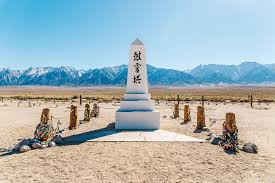Earned Third Place in Round One NYMidnight Short Fiction:
JiJi Returns To Manzanar
“JiJi, the park closes soon, we should probably ride back toward the exit.” I shout over my shoulder, assuming my grandfather is following right behind me on his teal Schwinn three-speed. Instead the dust flies up behind me and I see my seventy-year old Ojisan, pedaling with the speed of a junior high kid to the back side of the replica mess hall.
“What are you doing? Jiji!” I am breathing heavily as I finally catch him skidding to a stop.
“Shizukani, Mia! The rangers will hear us.” He jumps off his bike tucking it behind a large green dumpster, frantically gesturing for me to do the same, as we both hear the announcement over the loudspeakers.
“The Manzanar National Historic Site will be closing in five minutes. We ask that all guests make their way to the exit near the Visitor Center at this time. We will reopen again tomorrow morning at nine. The National Park Service thanks you for your visit and hope you come again.”
My grandfather is belly crawling along the back edge of the Mess Hall.
“JiJi, what the hell are you doing?” I should not have quit my karate lessons after high school. You’d think hauling wood chips and dirt at Yoshida and Sons Landscaping, I’d have some more stamina, but I can barely keep up with this man five decades older than me. He’s crawling through the large drain pipe under the park perimeter road now.
“I have to find something I left here.”
“We were not in this drain pipe, JiJi. I doubt it is here.”
“No, it’s something I left here back then.” He scurries down a small ravine keeping his back close to the dirt wall along the road..
I hear the NPS jeep in the distance. How can JiJi possibly think something from 1945 would still be here sixty years later? I knew there was something suspicious about how eager he was to come back to the park today. How, he kept calling this trip to California his “quest.” I realize now that yesterday what appeared to be a somber memory of the three years of his youth spent imprisoned in this once “relocation center”, was really Tommy Yoshida on a reconnaissance mission. I am suddenly sliding down the ravine.
“I knew I should have come on my own today. Mia, you are so out of shape.” He catches me before I plant my face in the dirt. “See that small outcropping of rocks by that dead old apple tree. That’s where we need to go, but keep yourself pressed here until that jeep leaves.”
“JiJi, we are going to get arrested. This is insane.This is federal land!”
“You want to know insane? It is stealing peoples’ businesses, then locking up whole families in the middle of a desert and calling it ‘relocation’.” His eyes stay fixed on the dead tree as he gruffly whispers. “Go on my signal, not a second before. And stay with me.”
The jeep stops for a moment at the top of the ravine. We hear the car door open then shut. Steps go toward the mess hall. Keys in a lock. The car door opens and shuts again. A bead of sweat blinds my left eye. The jeep pulls away.
Seconds later. “Go!”
We run to the dead tree and my grandfather pulls out a folding camp shovel from his backpack. JiJi sees the look of surprise on my face.
“Well, I’m not going to dig a meter with my bare hands!” He pushes me to the other side of the tree trunk. “You be on lookout.” He hands me binoculars. Well, that explains the insistence on carrying his own backpack today.
I hear digging as I scan the horizon. Looking out at this vast and deserted place. I am in awe that my Great Grandparents survived this upheaval from their gardening store in Seattle to this arid wasteland. And then I remember, Great Grandfather did not survive.
“You take over digging, Mia. I’ll be on lookout.” My grandfather shoves the sweaty handle toward my hand.
He’s gotten about 20 inches down already, more than half-way. The clay is packed and crumbly, but I suddenly hit something metal.
“That’s it!” My grandfather rushes to the hole scraping the remaining dirt away from a small dented tin bento box. He quickly shoves the box into his backpack. “Quickly, the sun is setting.”
I am scrambling back up the ravine, dirt caking into my fingernails. JiJi gets both bikes from behind the dumpster.
“Now, follow me and ride like the wind!” He swerves to the far end of the Visitor’s Center, toward the staff entrance and exit. Two National Park Rangers about to get in their cars stare at us quizzically.
“We got lost, sorry!” I don’t know what else to say as I pedal harder to catch up with JiJi.
Back at the motel, I am washing the sweat and dust off my face as my grandfather slowly takes out the tin box from his backpack.
“Are you going to at least show me what all that craziness was about?” I’m half afraid
these are Great Grandpa’s ashes or something.
Reverently, JiJi pulls off the lid, takes out a waxed cloth bag, and slowly pours seeds into
his hand.
“These are Sakura seeds. From Japan. My father brought them to America. It was one of the only things he had with him when we were evacuated from Seattle. I buried them here when my father never returned from the infirmary. It was our second year in the camp. I was ten years old.” He places the seeds back in the bag then hands the bag to me. “Take them, Mia-chan. Plant them.” Tears fill his eyes. “It is time for them to grow in American soil.”







